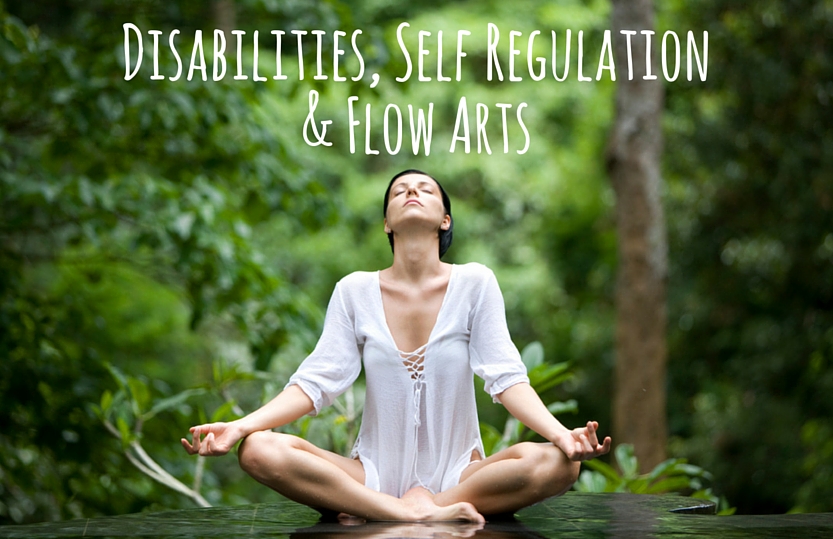There has been quite a bit anecdotal evidence about the benefits of Flow Arts in various mental health spheres since the beginning. Only within the past few years have we turned toward the larger scientific communities to more fully understand “why” it is beneficial for so many. For those diagnosed with either physical or mental disabilities, there are various aspects of Flow Arts which can help improve a person’s quality of life. One of the most basic ways this can benefit a person is by helping promote the concept of self regulation.
Self regulation is the ability to manage your emotions, behaviors, body, or thinking. For many people with disabilities, the ability to be “in control” of your person is not an innate skill and must be learned. There are many different techniques to help people self-regulate as it is an individual preference with activities working better for some than others. The most common activities tend to be categorized as either meditative or a form of physical activity. These principals connect very well to various aspects of Flow Arts.
Most, if not all, object manipulation helps to promote regulation by the simple act of movement. As the prop moves in a continuous pattern, such as spinning or tossing, our breathing begins to take on a similar relaxed pattern. This simple biological calming mechanism can help to both prevent and reduce anxiety, which is a condition many people with or without disabilities experience. For those trying to prevent panic attack situations, control hyperventilating, or simply calm their body; the repetitive full body movements can help put a person back in control of their being.
When people are dysregulated they are experiencing extreme feelings of being overwhelmed. These may also involve unwanted thoughts such as negative thinking or repeating the same thought multiple times. The most common, and sometimes the most difficult strategy, involves redirecting thinking to a more pleasant line of thought. Flow Arts promotes this by continuously offering new ways to concentrate on individual improvement. From learning a new trick to watching videos and wondering “how did they do that” to simply cleaning up your planes, there are options available for every skill level and interest.
Self regulation is a lifelong process that requires a certain amount of mindfulness. Object manipulation helps to take some of the guesswork out of what it is we need. When a person is not overwhelmed, they are better able to care for themselves and determine what caused them to be dysregulated in the first place. By learning what causes our dysregulation, we can use self regulation as a maintenance tool rather than as a reactionary tool to to help fix a current problem.


Comments 4
Do you have links to any scientific studies? I would love to read them.
https://youtu.be/Sttw2PxncIE?list=PL7W_U1PEOcqNWz59QAvUFXzYCGJ2e4-5D
^ Ted Talk on the neuroscience of juggling
Ted Talk on the benefits of juggling to ones mental health as a meditation practice
https://youtu.be/qzR62JJCMBQ?list=PL7W_U1PEOcqNWz59QAvUFXzYCGJ2e4-5D
Thanks for sharing!